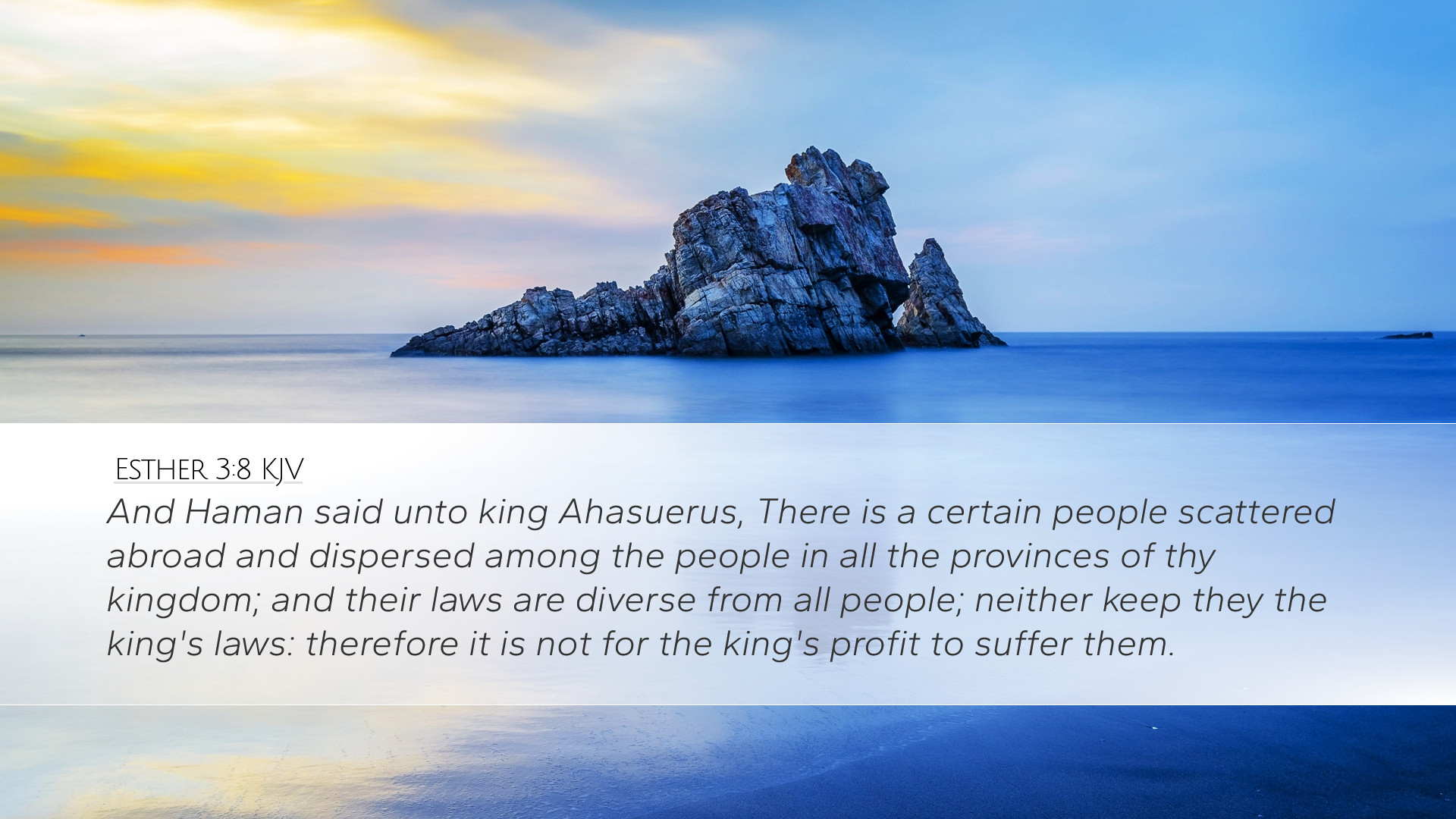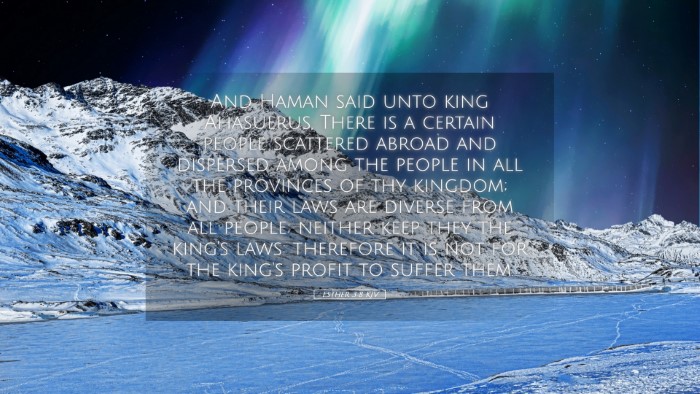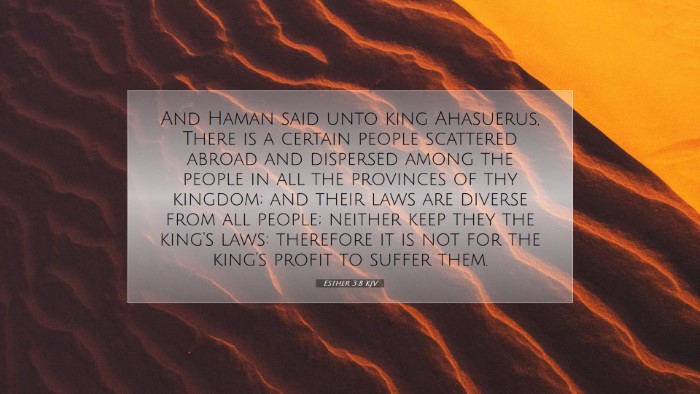Old Testament
Genesis Exodus Leviticus Numbers Deuteronomy Joshua Judges Ruth 1 Samuel 2 Samuel 1 Kings 2 Kings 1 Chronicles 2 Chronicles Ezra Nehemiah Esther Job Psalms Proverbs Ecclesiastes Song of Solomon Isaiah Jeremiah Lamentations Ezekiel Daniel Hosea Joel Amos Obadiah Jonah Micah Nahum Habakkuk Zephaniah Haggai Zechariah MalachiEsther 3:8
Esther 3:8 KJV
And Haman said unto king Ahasuerus, There is a certain people scattered abroad and dispersed among the people in all the provinces of thy kingdom; and their laws are diverse from all people; neither keep they the king's laws: therefore it is not for the king's profit to suffer them.
Esther 3:8 Bible Commentary
Commentary on Esther 3:8
Verse Context: Esther 3:8 states, "And Haman said unto King Ahasuerus, There is a certain people scattered abroad and dispersed among the people in all the provinces of your kingdom; and their laws are diverse from all people; neither keep they the king's laws: therefore it is not for the king's profit to suffer them." This verse is pivotal in the narrative of Esther, as it marks the beginning of Haman's diabolical plot against the Jews.
Historical and Theological Significance
Historical Context: The verse takes place during the reign of King Ahasuerus (Xerxes I), a time when the Jewish people had returned from Babylon but were still under Persian rule. Haman's accusation highlights the socio-political tensions between the Jews and the Persian authority.
Theological Implications: This passage serves as an example of how God's people are often persecuted for their distinct identity and beliefs. Haman's statement underscores a theme of opposition to God's covenant people, which is a recurrent motif in Scripture.
Commentary Insights
Matthew Henry's Commentary
Matthew Henry emphasizes the portrayal of Haman’s treachery through a crafty manipulation of the king’s perspective. Henry notes that Haman appeals to the king’s desire for order and stability by characterizing the Jews as a disruptive element within the empire. His argument suggests a perceived threat to the king's authority based on the Jews’ unique laws and customs.
Albert Barnes' Commentary
Albert Barnes elaborates that Haman's words are strategically chosen. He does not directly mention the Jews, but rather refers to them as "a certain people". This vagueness is designed to evoke suspicion and fear, playing upon the king's insecurities. Barnes points out that Haman’s intent is not merely to inform the king but to instigate a murderous decree that would lead to the annihilation of the Jewish people.
Adam Clarke's Commentary
Adam Clarke adds layers of understanding to the text by discussing the underlying arrogance of Haman. He notes that Haman's character is emblematic of pride and cruelty, viewing the Jewish people not just as a political issue but as an ideological affront to his power. Clarke emphasizes the importance of recognizing Haman’s manipulation of Ahasuerus, using the king's own authority against him.
Literary Analysis
The structure of Esther 3:8 reveals a calculated approach in Haman’s discourse. The rhetorical strategy includes:
- Appeal to Authority: Haman speaks directly to the king, placing his own personal vendetta into the fabric of royal decree.
- Impersonal Language: By avoiding direct reference to the Jews, Haman creates distance, which allows for easier acceptance of his proposal to eliminate them.
- Use of Fear: Portraying the Jews as a dangerous and insubordinate group incites fear in the king, which is a tool often used by leaders in history to rally support for oppressive measures.
Pastoral Applications
This verse invites pastors to reflect on the implications of cultural and religious distinctions within contemporary contexts. The church today faces similar challenges where believers may find their values and practices at odds with prevailing cultural norms. Pastors might consider:
- Understanding Opposition: Acknowledge that opposition to God’s people is a part of the human experience, often arising from misunderstanding and fear.
- Encouraging Identity in Christ: Emphasize the importance of maintaining a distinct Christian identity amid cultural challenges, much like the Jewish people in Esther's time.
- Promoting Unity and Prayer: Encourage unity among congregants in prayer and action, invoking the support and protection of God as demonstrated through Esther's eventual intercession.
Theological Reflections
This verse necessitates deep theological reflection on sovereignty, providence, and the nature of evil. Haman represents the forces that oppose God's plan, yet through this conflict, we see God's overarching providence at work.
- Sovereignty of God: Despite Haman's machinations, the narrative ultimately underscores that God is in control, guiding events toward redemption.
- Human Responsibility: Haman’s actions highlight the reality of human choice and the moral implications of those choices, calling us to consider our own decisions in light of God’s truth.
- Hope in Adversity: As the Jewish people face existential threats, believers are reminded that hardships often precede deliverance, encouraging resilience in faith.
Conclusion
Esther 3:8 serves as a rich vein of theological and practical insight. By examining Haman's plot against the Jews, we gain a deeper understanding of the nature of evil, the complexities of leadership, and the importance of remaining steadfast in faith amidst adversity. This commentary also emphasizes the relevance of Esther’s story for modern believers, providing a framework for understanding trials, moral complexities, and the ongoing need for divine intervention in the face of persecution.


